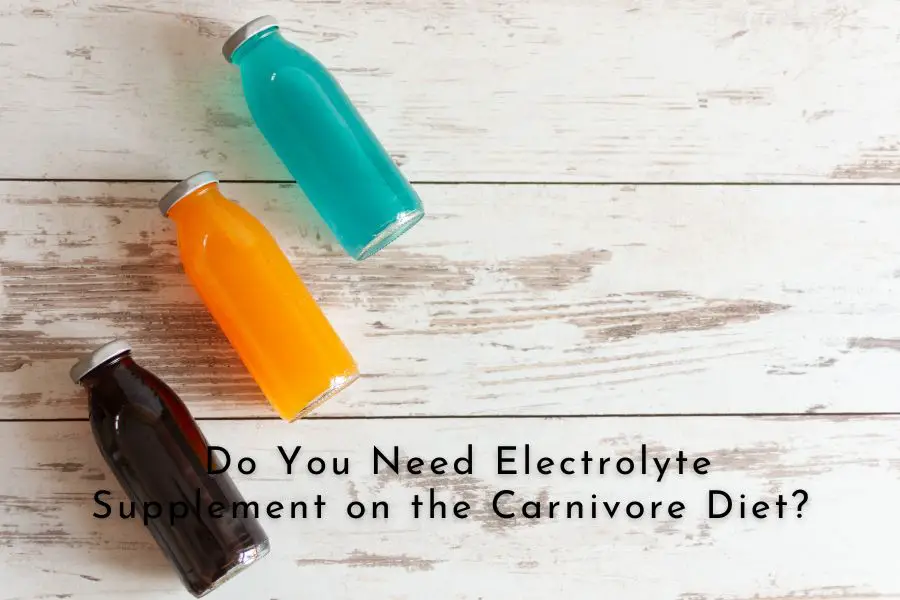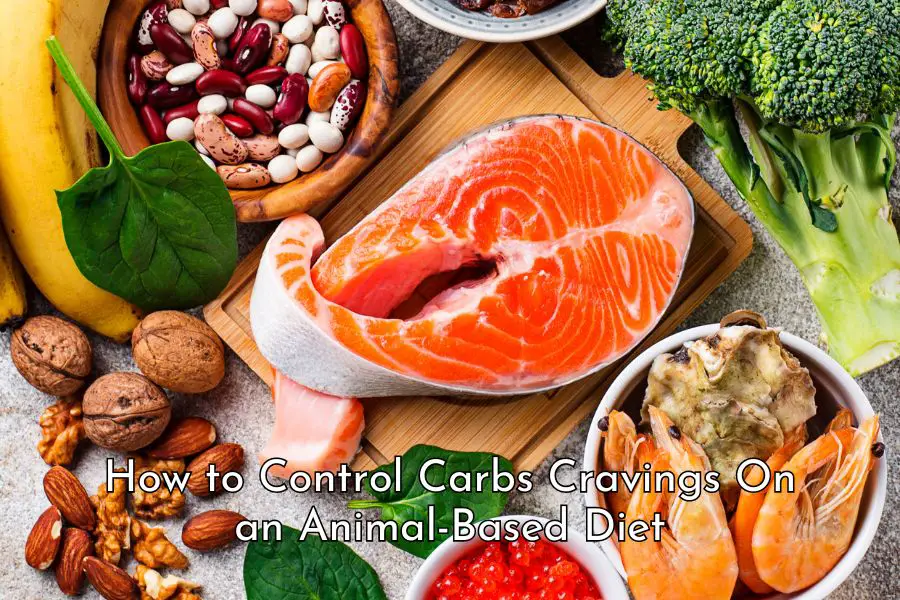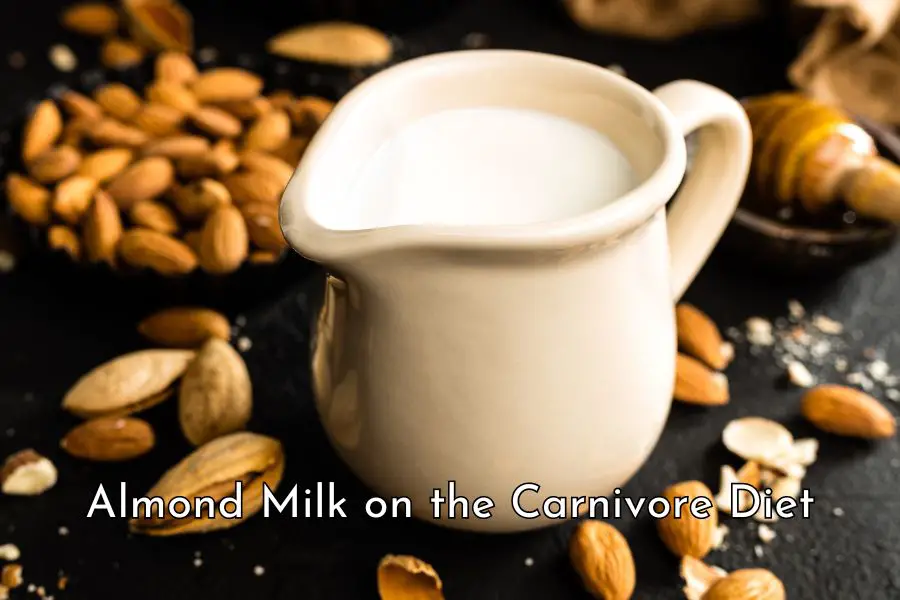In this article, we cover what electrolytes are, their critical functions in the human body and whether you need electrolyte supplement on a carnivore diet.
Table of Contents
- What Are Electrolytes?
- Electrolytes’ Roles in the Human Body
- Do You Need Electrolyte Supplement on a Carnivore Diet?
- The Argument for Electrolyte Supplements
- When You May Need Electrolyte Supplements
- The Best Electrolytes to Use
- Conclusion
What Are Electrolytes?
In nutrition, electrolytes refer to chemicals that are electrically charged and essential for various critical physiological functions in the human body and other living organisms. [1, 2, 3]
The most common electrolytes in the human body include: [4]
- Sodium
- Potassium
- Chloride
- Magnesium
- Calcium
- Phosphate
- Bicarbonates
Electrolytes’ Roles in the Human Body
Each electrolyte plays specific and important functions in the human body: [5, 6, 7, 8, 9, 10, 11, 12, 13, 14, 15, 16, 17, 18, 19, 20, 21]
- Sodium: Sodium ions are primarily found in the blood and in the fluid around cells and are important for maintaining the extracellular fluid volume, nerve function, and muscle contractions.
- Potassium: Potassium ions are present in all body tissues and are critical for maintaining nerve function, muscle contractions and regular heart rhythm.
- Chloride: Chloride plays a key role in the regulation of body fluids, electrolyte balance, acid-base balance, digestion, immune response, and nerve and muscle function.
- Magnesium: Magnesium plays many important roles in the normal functioning of the human body. It is involved in more than 300 biochemical processes in the body, from maintaining normal muscle and nerve function, supporting a healthy immune system, protein synthesis, energy production, and controlling blood glucose to regulating blood pressure.
- Calcium: Calcium plays many important roles including building strong bones and teeth, blood clotting, transmission of nerve signals, muscle contraction, regulating normal heart rhythms and hormone regulation.
- Phosphorus: As the second most abundant mineral in the human body, phosphorus plays a vital role in a wide range of physiological processes. These include bone and tooth formation, energy metabolism, cellular functions, kidney function, tissue and cell growth, maintenance, and repair, as well as the production of the genetic building blocks, DNA and RNA.
- Bicarbonate: Bicarbonate’s primary role is to maintain the body’s acid-base balance, also known as pH balance.
Maintaining a balanced intake of electrolytes through a healthy diet and adequate hydration is important for overall health and well-being. Electrolyte imbalance can lead to a number of health issues including: [22, 23]
- Seizures
- Irregular heartbeat
- Confusion
- Metabolic acidosis (buildup of acids in the blood)
- Fatigue
- Lethargy
- Muscle weakness.
Do You Need Electrolyte Supplement on a Carnivore Diet?
In my opinion, there is no need to supplement with electrolytes on a carnivore diet. Although food on the carnivore diet is not known as rich sources of electrolytes, people on a carnivore diet or a mostly meat-based diet have not demonstrated symptoms of electrolyte deficiencies or imbalances.
Societies that traditionally followed a predominantly meat-based diet, such as the Tsimane, Maasai, Arctic Inuit, and Hadza, showed no indications of mineral deficiencies nor suffered from modern-day diseases like high blood pressure, atherosclerosis, or cardiovascular disease until they began adopting Western dietary patterns. The Arctic Inuit, for instance, historically derived nearly 99% of their caloric intake from animal sources like seals, fish, whales, and mussels, yet they have notably lower rates of heart disease compared to populations in other parts of the world. [24, 25, 26, 27, 28, 29]
The International Center for Medical Nutritional Intervention (ICMNI), formerly known as Paleomedicina, based in Hungary, has been using a high-fat animal-based diet to successfully treat many chronic diseases since 2012.
In their protocol, they recommend patients to eat only quality meat, fat and organs and drink only water. They do not recommend taking any supplements. In fact, one of their first general therapeutic steps is to discontinue all dietary supplements and reconsider all existing medications. Their patients not only did not report any sign of deficiencies in essential nutrients but also recovered from chronic and serious health issues, including diabetes, obesity, autoimmune diseases, leaky guts and cancer. [30, 31, 32, 33, 34, 35, 36, 37, 38, 39, 40, 41]
In 1928, Vilhjalmur Stefansson, an Arctic explorer, anthropologist, lecturer, and prolific writer, along with Karsten Anderson, a member of Stefansson’s expeditions, participated in an experiment conducted at Bellevue Hospital. During this experiment, the two men consumed a meat-only diet for one year under supervision. [42]
At the conclusion of the experiment, it was determined that both Stefansson and Anderson were in excellent health and experienced no adverse effects from the diet. They remained mentally alert, physically active, and exhibited no abnormal physical changes. Their dental health showed no signs of deterioration, and their bowel movements remained normal. Furthermore, the men did not suffer from any vitamin deficiencies. [43]
In summary, there is a lack of evidence indicating that people on a carnivore or meat-based diet experience mineral deficiencies, making electrolyte supplementation unnecessary.
The Argument for Electrolyte Supplements
Some people argue that electrolyte supplement on the carnivore diet is necessary because animal-based food does not provide enough electrolytes to meet the recommended daily intakes.
It is true that, for some minerals, animal-based food may not provide enough to meet the recommended daily allowances (RDAs) if you don’t consume a wide variety of animal-based food or don’t adhere to a nose-to-tail approach on the carnivore diet.
As an example, the RDAs for magnesium can range from approximately 300 to 400 mg per day, depending on factors such as age, gender, and pregnancy status. Muscle meat, such as steak, contains approximately 23 mg of magnesium per 100 grams. Therefore, if you eat only muscle meat, you won’t be able to meet the daily magnesium intake goals of 300 to 400 mg. [44, 45]
However, a major flaw with this argument is that the RDAs for essential nutrients are established for the general population who are most likely to be on an omnivore diet with substantial plant-based food intake. These RDAs are not specifically tailored to individuals adhering to a strict animal-based diet.
For example, the Dietary Guidelines for Americans, 2020-2025 recommends Americans to get 45% to 65% of calories from carbohydrates, advocating for the consumption of a significant amount of plant-based foods and, consequently, exposing them to a substantial amount of plant anti-nutrients. [46]
Plant anti-nutrients (e.g. phytate, oxalate, lectin, and tannins) have been found to interfere with nutrient absorption. For example, phytate (present in grains, seeds, beans, legumes, and nuts) can bind to minerals, such as calcium, iron, magnesium, manganese, and zinc. Oxalate found in food such as spinach, rhubarb, beets, almonds, cashews, peanuts, lentils, chocolate, tea, raspberries, and dates can also bind to minerals, such as calcium, iron and magnesium in the digestive tract. Tannins, on the other hand, interfere with the absorption of iron by binding to non-heme iron in the stomach and intestines. [47, 48, 49, 50, 51, 52, 53, 54, 55, 56, 57, 58]
When you are on a carnivore diet, in the absence of plant-based food and anti-nutrients, your body will be able to absorb nutrients from animal sources much better than from plant sources. Consequently, you may not require as much nutrient intake, as your body efficiently soak up the nutrients from whatever food you consume.
When You May Need Electrolyte Supplements
Only in rare cases, such as chronic diarrhea, frequent vomiting, extreme heat, during intense workouts resulting in significant electrolyte loss through sweat, or illness (e.g. kidney diseases), electrolyte supplements might be warranted.
In a survey conducted by researchers at Harvard University involving 2029 individuals who had followed the carnivore diet for a minimum of 6 months, it was found that:
- 59% didn’t use electrolyte at all
- 17% used at least daily; and
- 24% used from a few times a year to a few times a week.
Thus, within this surveyed population, the majority (59%) didn’t use electrolyte supplements, a minority (17%) used them daily and a significant portion (24%) turned to supplementation sporadically. It is unclear whether those who chose to supplement did so out of genuine necessity or because they were led to believe that they needed to supplement to get enough electrolytes while on the carnivore diet.
The Best Electrolytes to Use
If you happen to need electrolyte supplements, look for brands that have only electrolytes (e.g. sodium, magnesium, calcium, potassium, etc.), natural flavors and natural sweeteners. Avoid electrolytes with added sugar, artificial sweeteners, other chemicals or plant extracts.
For example, I would prefer an electrolyte made with “Salt, Malic Acid, Magnesium Malate, Potassium Cloride, Natural Flavor, Stevia” over the one made with “Sweetener (Erythritol), Acidity Regulators (Citric Acid, Potassium Citrate, Malic Acid), Minerals (Calcium Citrate, Magnesium Citrate), L-Glutamine, Beetroot Juice Powder, Salt, Flavours, Sweetener (Sucralose).”
I think the best option is to make your own electrolyte drink using natural ingredients whenever it is convenient to do so.
Below are three simple recipes for you to get started.
1. Bone broth
Bone broth is 100% carnivore and a great way to add electrolytes as well as other essential nutrients to your diet.
Check out this easy bone broth recipe with answers to a lot of FAQs about bone-broth making.
If you are making bone broth to replenish your electrolytes:
- Use bones that have a bit of meat on to increase the electrolyte content of your broth
- Chill the broth overnight and skim off the solid fat on top to make it easier to drink.
2. Coconut, lemon and sea salt
Ingredients:
- 2 cups filtered water
- juice of 1 lemon
- 2 cups raw coconut water
- 1/4 tsp salt
Put all ingredients in a drink bottle, shake well, and chill for 15 minutes.
Coconut water is a low-sugar beverage that provides a significant amount of potassium, sodium, and magnesium. On the other hand, lemon juice is exceptionally high in vitamin C and also contains trace amounts of other essential nutrients, including folate, vitamin B6, thiamine, potassium, magnesium, calcium, and phosphorus. [59, 60]
3. Lemon, honey and sea salt
Ingredients:
- 4 cups filtered water
- juice 1 lemon
- 1/2 tsp sea salt
- 1 tbs raw honey
Put all ingredients in a drink bottle, shake well, and chill for 15 minutes.
Conclusion
Meat, fat and organ meat already contains all electrolytes including sodium, chloride, potassium, magnesium, phosphate and calcium in perfect proportions. No supplement can replicate this perfect natural electrolyte ratio and no supplement is necessary in most cases.
Exceptions may arise in rare instances, such as chronic diarrhea, frequent vomiting, or during intense workouts resulting in significant electrolyte loss through sweat. In such cases, electrolyte supplements might be warranted.
When you decide whether you should take a certain supplement, look at the evidence, don’t read unsubstantiated claims on supplement labels and be very skeptical when listening to advice from those who have something to sell you.
Other posts you might be interested in:
Carnivore vs Low-Carbs vs Moderate-Carbs vs High-Carbs
Tips On Raising Children On a Carnivore or Animal-Based Diet
Is Carnivore Diet + Fruit & Honey a Good Idea?
What Is the Best Meat to Eat on the Carnivore Diet?
Best Sources of Vitamin C on the Carnivore Diet
Best Sources of Omega 3 on the Carnivore Diet
Can You Eat Only Ground Beef On the Carnivore Diet?
How Much Organ Meat Should You Eat on the Carnivore Diet?
What Do Hardcore Carnivores Eat in a Day?
Disclaimer: The information in this post is for reference purposes only and is not intended to constitute or replace professional medical advice. Please consult a qualified medical professional before making any changes to your diet or lifestyle. Please check out our disclaimer for more detail.





